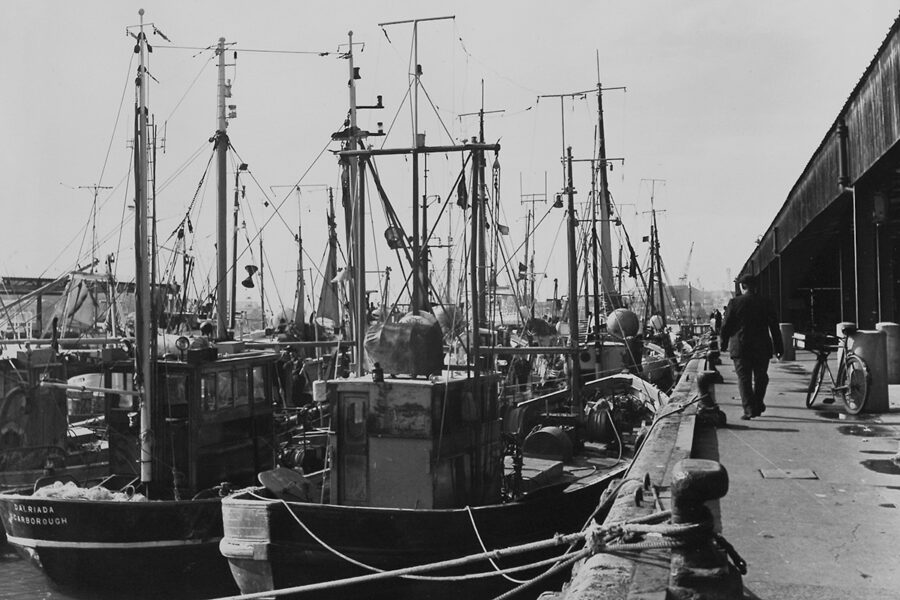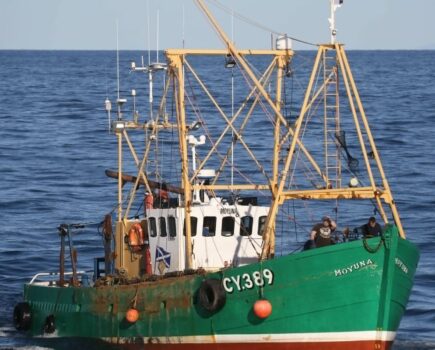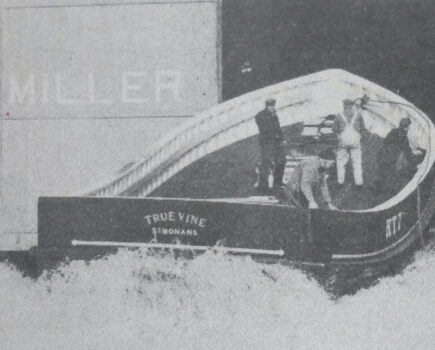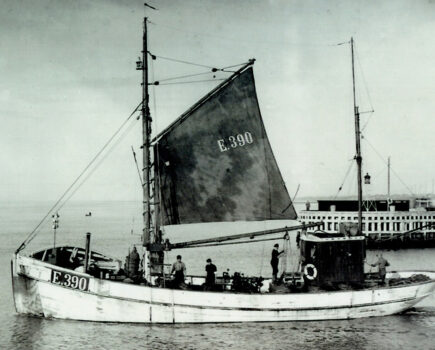Photographer Laszlo Torday documented the North East of England, including the North Shields fishing industry, for decades. Yet little is known of him – or about his pictures. Brian W Lavery reports…
Day after day, year after year, he went unnoticed as he took his pictures.
It is clear from the candid photography of Laszlo Torday that he must have been a master at blending in.
His thousands of pictures of everyday life across the North East includes a large archive portraying the fishermen of North Shields.
On his death in 1975, more than 6,000 photos and slides were acquired by the Newcastle city library service, which now provides free access to them.
The collection was bought by the library service from a local dealer, and includes 100 photographic albums of black and white prints and 16 boxes of colour transparencies.
Copies of some of his work have been incorporated into the main collection of photographs in the library’s heritage section. A thousand of these images have been digitised and can now be enjoyed by a wider audience.
From the 1940s to the 1970s, with the majority of his pictures taken in the 1960s and 1970s, Laszlo Torday snapped everyday scenes. I found his work by accident while researching the source of a photograph, and felt his work deserved a much larger audience.
Each photo is a pictorial time capsule, a captured freeze-frame of social history.
Laszlo’s ability to go unnoticed may not only have helped him in his photography – it was probably one of the skills that kept him alive when he was forced to flee his native Hungary to escape the Nazis.
There is little written or known about the Tordays before their arrival from Budapest, and their documented time in Britain mainly centres around the chemical engineering company that Laszlo founded and the literary achievements of his descendants. Little has been recorded about his photographic work.
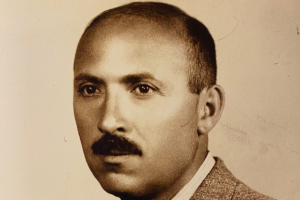
Photographer Laszlo Torday as a young man. (Photo: Piers Torday)
I spoke with London-based author and playwright Piers Torday about the life and times of the man behind the lens.
Piers, who has been researching his ancestry, is the industrialist-cum-photographer’s great-grandson.
He said: “I was researching my family tree in lockdown, but I don’t know that much about their past. But maybe that’s the way they wanted it to be, in common with many who fled for their lives in similar circumstances.”
Laszlo Torday, a chemical engineer and industrialist, was a Hungarian Jew. His family were secular, but that would have made no difference to their fate at the hands of the Nazis.
In the 1930s, his son, also called Laszlo, left to study physics in Manchester, as it had become illegal for Jewish people to attend universities in Hungary.
Piers said: “The family were actually very wealthy in Hungary, and owned a very successful engineering business.
“They were driven around the city by chauffeurs and wore furs, and all that sort of thing. But, of course, they could not take all that wealth out with them.”
Laszlo Torday’s father Armand was a right-wing newspaper editor in Budapest, where he was known as a swashbuckling bowler-hatted character who swaggered around his native city brandishing his swordstick – which he was once rumoured to have used to dispatch a group of communist agitators who crossed his path.
But now, in the mid-1930s, it was the Nazis who were coming for the Tordays and families like them.
Piers said: “The reason they left Budapest when they did was because one of the things they made was ball bearings – vital for munitions – and one of the biggest clients for these was in Berlin. It was he who warned them that they should go.”
When the Tordays got their warning, they took heed, as it came from the most unlikely, but also the most informed, of sources.
For the client in Berlin was leading Nazi Ernst Röhm, a founder of the party and former top ally of Hitler – later executed on Hitler’s orders during the ‘Night of the Long Knives’.
He told the Tordays: “I am not speaking to you as a Nazi but as a business ally. You really need to go.”
Laszlo and his wife Ilona followed his eldest son to England with their other children and settled in North Shields where he founded Torday Ltd, a chemical and electroplating engineering company that provided much- needed employment for the region in the post-war years.
Founded in 1940, the business initially operated from a disused canteen near the river Tyne, where the rent was £50 per year.
Piers said: “The family were given the choice of going to Paris or Newcastle.” The fact that the British government gave them an incentive of state aid to help set up an engineering business in North Shields might explain the family’s choice of new home.
Piers added: “When I was young, I asked my grandfather many questions about things in Hungary, but he never really wanted to talk about the past.
“His father was a keen photographer since his youth, which may be something to do with his father being a newspaperman.
“I think when he arrived here, having lost so much and then having to process so much in a new country, that photography was his way of partly processing what he had lost while documenting the new world around him.
“It was his way of interpreting his world, I suppose.
“He carried a camera everywhere. There was even always one in the boot of his car.”
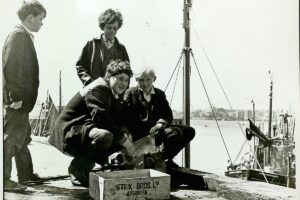
Future fishermen on North Shields quayside (Tor045). Are you among them?
The Torday family made a massive contribution to their adopted country industrially, economically and culturally. It is the latter contribution that was to become best known.
Torday Ltd was very successful and became an international brand. As well as providing employment in North Shields across the years, the company made major contributions to marine and chemical engineering.
One of its most famous products is the ‘rupture disk’ – a safety product originally designed to protect pressurised gas containers and equipment. You see it in action every day, for its technology was adapted for carbonated drinks cans, and is the reason the bottoms of these cans are indented – to allow them to expand if over-carbonated, rather than explode.
Its success established the firm in Switzerland, Oslo, Paris and the USA. The company was taken over by an American conglomerate a few years ago.
But the Tordays also have a significant legacy of artistic and creative works.
Laszlo’s photography is now a public asset for historians yet to come.
His son Laszlo wrote academic books – but it was the final Torday connected with the family business who made the greatest cultural impact thus far.
His grandson Paul Torday was still an engineering company executive when, at the age of 60, his acclaimed novel, Salmon Fishing in the Yemen, was published in 2007. The book was inspired by his experience in the oil and gas industry in the 1990s, coupled with an acute understanding of the insanity of much government bureaucracy.
It became a movie starring Ewan McGregor, Emily Blunt and Kristin Scott-Thomas. Sadly, Paul Torday died just six years later, aged 67.
He also left his mark on another sort of fishing. Piers said: “My father was a keen angler, and spent years involved with getting the river Tyne clean and thereby increasing its stocks of salmon.”
Like the family’s multi-faceted legacies, much of the history behind Laszlo Torday’s photographs is unrecorded. Most of his photographs are uncaptioned, which may help to explain why they are not better known.
I only discovered the archive when I accidentally stumbled across a striking image that I needed to know more about. Now you can share in it too.
Help to improve the Torday photo archive
The Newcastle city library service is keen to find out more about the pictures in the Torday collection, and is asking anyone who recognises anyone in the images to get in touch. Each has a unique code, starting ‘Tor’.
You can view the whole collection here.
If you have any information, please contact the library service here, at the Facebook page here, by phone on: 0191 278 7878, or by email at: sarah.mulligan@newcastle.gov.uk.
This story was taken from the 30 September issue of Fishing News. For more nostalgic in-depth reports on the UK and Irish commercial fishing sector, subscribe to Fishing News here or for the full article, which includes all images, buy the 30 September issue for just £3.30 here.

